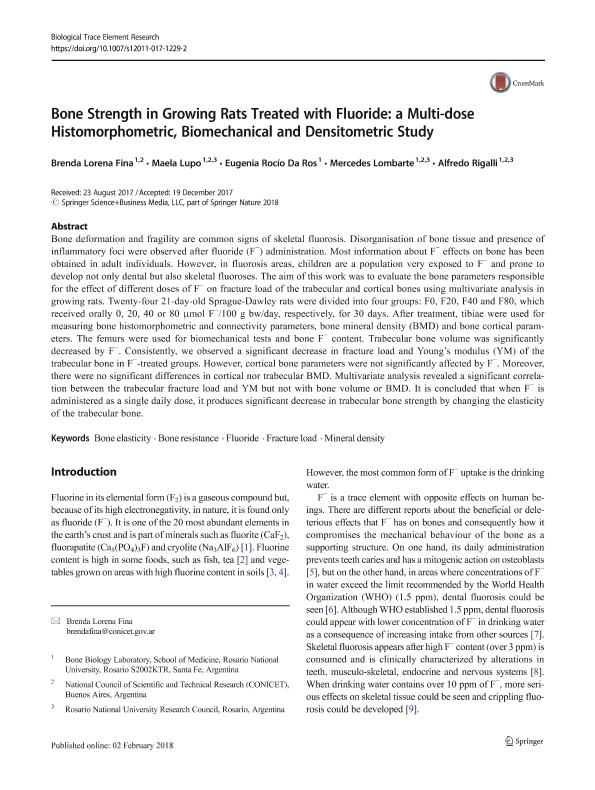Mostrar el registro sencillo del ítem
dc.contributor.author
Fina, Brenda Lorena

dc.contributor.author
Lupo, Maela

dc.contributor.author
Da Ros, Eugenia Rocío
dc.contributor.author
Lombarte, Mercedes

dc.contributor.author
Rigalli, Alfredo

dc.date.available
2020-03-25T18:31:28Z
dc.date.issued
2018-10
dc.identifier.citation
Fina, Brenda Lorena; Lupo, Maela; Da Ros, Eugenia Rocío; Lombarte, Mercedes; Rigalli, Alfredo; Bone Strength in Growing Rats Treated with Fluoride: a Multi-dose Histomorphometric, Biomechanical and Densitometric Study; Springer; Biological Trace Element Research; 185; 2; 10-2018; 375-383
dc.identifier.issn
0163-4984
dc.identifier.uri
http://hdl.handle.net/11336/100751
dc.description.abstract
Bone deformation and fragility are common signs of skeletal fluorosis. Disorganisation of bone tissue and presence of inflammatory foci were observed after fluoride (F−) administration. Most information about F− effects on bone has been obtained in adult individuals. However, in fluorosis areas, children are a population very exposed to F− and prone to develop not only dental but also skeletal fluoroses. The aim of this work was to evaluate the bone parameters responsible for the effect of different doses of F− on fracture load of the trabecular and cortical bones using multivariate analysis in growing rats. Twenty-four 21-day-old Sprague-Dawley rats were divided into four groups: F0, F20, F40 and F80, which received orally 0, 20, 40 or 80 μmol F−/100 g bw/day, respectively, for 30 days. After treatment, tibiae were used for measuring bone histomorphometric and connectivity parameters, bone mineral density (BMD) and bone cortical parameters. The femurs were used for biomechanical tests and bone F− content. Trabecular bone volume was significantly decreased by F−. Consistently, we observed a significant decrease in fracture load and Young’s modulus (YM) of the trabecular bone in F−-treated groups. However, cortical bone parameters were not significantly affected by F−. Moreover, there were no significant differences in cortical nor trabecular BMD. Multivariate analysis revealed a significant correlation between the trabecular fracture load and YM but not with bone volume or BMD. It is concluded that when F− is administered as a single daily dose, it produces significant decrease in trabecular bone strength by changing the elasticity of the trabecular bone.
dc.format
application/pdf
dc.language.iso
eng
dc.publisher
Springer

dc.rights
info:eu-repo/semantics/openAccess
dc.rights.uri
https://creativecommons.org/licenses/by-nc-sa/2.5/ar/
dc.subject
BONE ELASTICITY
dc.subject
BONE RESISTANCE
dc.subject
FLUORIDE
dc.subject
FRACTURE LOAD
dc.subject
MINERAL DENSITY
dc.subject.classification
Otras Ciencias de la Salud

dc.subject.classification
Ciencias de la Salud

dc.subject.classification
CIENCIAS MÉDICAS Y DE LA SALUD

dc.title
Bone Strength in Growing Rats Treated with Fluoride: a Multi-dose Histomorphometric, Biomechanical and Densitometric Study
dc.type
info:eu-repo/semantics/article
dc.type
info:ar-repo/semantics/artículo
dc.type
info:eu-repo/semantics/publishedVersion
dc.date.updated
2020-03-25T13:25:37Z
dc.journal.volume
185
dc.journal.number
2
dc.journal.pagination
375-383
dc.journal.pais
Alemania

dc.journal.ciudad
Berlín
dc.description.fil
Fil: Fina, Brenda Lorena. Universidad Nacional de Rosario; Argentina. Consejo Nacional de Investigaciones Científicas y Técnicas; Argentina
dc.description.fil
Fil: Lupo, Maela. Consejo Nacional de Investigaciones Científicas y Técnicas; Argentina. Universidad Nacional de Rosario; Argentina
dc.description.fil
Fil: Da Ros, Eugenia Rocío. Universidad Nacional de Rosario; Argentina
dc.description.fil
Fil: Lombarte, Mercedes. Universidad Nacional de Rosario; Argentina. Consejo Nacional de Investigaciones Científicas y Técnicas; Argentina
dc.description.fil
Fil: Rigalli, Alfredo. Universidad Nacional de Rosario; Argentina. Consejo Nacional de Investigaciones Científicas y Técnicas; Argentina
dc.journal.title
Biological Trace Element Research

dc.relation.alternativeid
info:eu-repo/semantics/altIdentifier/url/http://link.springer.com/10.1007/s12011-017-1229-2
dc.relation.alternativeid
info:eu-repo/semantics/altIdentifier/doi/http://dx.doi.org/10.1007/s12011-017-1229-2
Archivos asociados
